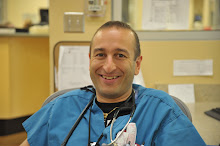An Open Letter from America's Emergency Physicians
As the physicians on the front lines of emergency care, we see the tragic problems of a failing health care system. We care for people who are ravaged by untreated disease; help worried mothers on weekends with sick children, unable to access a system that's open 9 to 5, weekdays only; and treat the victims of heart attack, stroke and injuries whose very lives depend on our care.
The role of emergency medicine has been badly misrepresented during the health care reform debate. The American College of Emergency Physicians supports comprehensive reform, including universal coverage. But it is vitally important that reform legislation not be based on erroneous perceptions, but instead address the critical problems harming emergency patients. It is time to debunk the myths, focus on the real problems and outline solutions to ensure that health care reform will protect and enhance everyone's access to quality, timely emergency care.
Myth: Emergency medical care is expensive and inefficient. Reducing emergency care will "bend the cost curve" on our nation's rising health care costs.
Fact: The 120 million annual visits made to emergency departments account for only 3% of all health care spending. In addition, emergency departments are equipped with state-of- the-art diagnostic equipment and highly trained physicians who can draw on many hospital resources quickly, providing coordinated, efficient patient care. The fixed costs of being open 24/7 are high, but the variable costs for seeing patients in the emergency department are the same as anywhere else care is provided.
Myth: Emergency departments are crowded with patients seeking non-urgent care.
Fact: Only 12.1% of emergency patients have non-urgent conditions that could wait 2 to 24 hours for medical care, according to the Centers for Disease Control and Prevention (CDC). While this percentage may be slightly higher in some hospitals, the reality is that crowded conditions and longer wait times are primarily caused by patients being "boarded," or forced to stay in the emergency department - often on gurneys lining the hallways - long after they have been seen and admitted to the hospital.
Myth: Your local emergency department will always be there when you need it.
Fact: Hundreds of emergency departments have closed nationwide because of an overburdened emergency care system. Those remaining must accommodate an average increase of 3 million more patient visits each year. Every 60 seconds emergency care is delayed when an ambulance is diverted to a distant hospital because a nearer one is unable to accept more patients. In addition, 75% of emergency department directors report significant problems getting needed on-call specialists, such as neurosurgeons and orthopedists, to provide vital on-call services to emergency patients.
Myth: The need for emergency care will decrease when health care reform is enacted.
Fact: With a growing and aging population, our role in providing care to the sick and injured any time day or night, and our front line responsibility in responding to natural and man-made disasters, will be in even greater demand in the future. Since enacting its universal health care legislation, Massachusetts has experienced an increase in emergency department patients. Emergency medicine is an essential community service that is vitally important to our nation's health care system.
To help ensure our country has a strong emergency care system, the American College of Emergency Physicians supports comprehensive health care reform that includes:
- Every person in America must have meaningful and affordable health insurance coverage provided through a combination of employer and individually mandated insurance. It should be means-tested, allowing those in need to receive coverage or financial support to buy insurance. A combination of private sector and governmental solutions may be needed to achieve universal coverage. America is experiencing a dramatically rising tide of uninsured and underinsured patients. Emergency physicians are the only doctors in the country required by federal law to treat all patients regardless of their ability to pay. It is a responsibility we embrace proudly, but many emergency departments and physician groups are closing under the burden of uncompensated care.
- Health care costs must be reduced. Significant medical liability reform is needed to eliminate unnecessary, expensive tests known as "defensive medicine." Liability reform can also help increase the availability of critically needed on-call specialists. Widespread adoption of electronic health records could substantially cut costs and improve patient care if there were complete integration of data between the emergency department and other medical settings. Administrative and overhead costs must be reduced.
- Quality and patient safety must be improved by eliminating the practice of "boarding" admitted patients in emergency department hallways until they are transferred to an in-patient hospital bed. This can be achieved by establishing quality standards that define how quickly admitted patients are moved to their appropriate care settings, with such information reported and available to the public.
- A national surge capacity plan must be developed and resources provided to prepare our nation's hospital emergency departments for public health crises such as the H1N1 pandemic, a terrorist attack or other catastrophes.
With so much at stake, America can no longer ignore the crisis in its emergency medical care system or make health reform decisions based on myths. Go to www.acep.org/realities for information on protecting your access to quality, timely emergency care.
We must act now.
Nick Jouriles, MD, FACEP
President
American College of Emergency Physicians




Inga kommentarer:
Skicka en kommentar